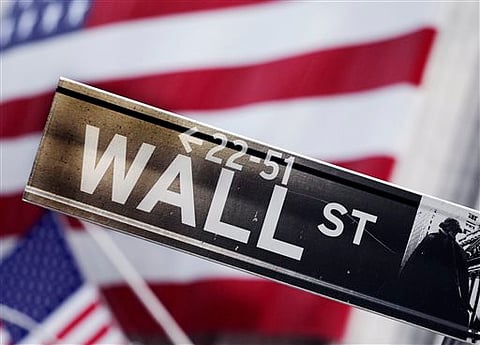

Financial markets around the world are reeling following President Donald Trump’s latest and most severe volley of tariffs, and the dollar slumped by as much as 2.6 percent versus the euro, its biggest intraday plunge in a decade, and suffered sharp losses also against the yen and British pound.
The U.S. stock market may be taking the worst of the tariff shock. Little was spared as fear flared globally about the potentially higher inflation and weakening economic growth that tariffs can create. Prices fell for everything from crude oil to Big Tech stocks to small companies that invest only in U.S. real estate.
"The simultaneous decline in both stocks and the US dollar speaks volumes about investor confidence in Trump's trade policy," said City Index and FOREX.com analyst Fawad Razaqzada.
The U.S. Senate voted 51-48 to counter Trump’s tariffs on Canada by ending the presidential emergency declaration on fentanyl Trump used to justify them. The resolution has little chance of passing the Republican-controlled House but shows the limits of GOP support for Trump’s vision of remaking the U.S. economy by restricting free trade.
A new AP-NORC poll shows Trump’s dramatic changes to the federal government have yet to emerge as an obvious political winner or loser.
And while U.S. Secretary of State Marco Rubio and the Trump administration’s new envoy to NATO seek toreassure wary allies of the U.S. commitment to the alliance, the current Supreme Allied Commander Europe tells senators that if the U.S. relinquishes this commander role, it could put large numbers of U.S. troops under non-U.S. command for the first t
World readers react to "brutal" new tariffs
French President Emmanuel Macron called for suspending investment in the United States until what he called the "brutal" new tariffs had been "clarified."
But the 27-nation EU and other countries also showed willingness to negotiate as they refrained from immediate retaliatory measures, with almost a week until the harsher US levies actually take effect.
Beijing said it was "maintaining communication" with Washington over trade issues, and EU trade chief Maros Sefcovic planned to speak with US counterparts on Friday.
In Latin America, Brazil's president vowed to take "all appropriate measures," while Mexican President Claudia Sheinbaum expressed relief at being left off the new round of tariffs -- even if the major US trading partner is already on the hook for 25 percent tariffs on some products.
Gold prices hit a new record high, oil fell and the dollar slumped against other major currencies.
"The last 24 hours have seen an historic transformation to the global trading system," said Deutsche Bank analyst Jim Reid.
What's Trump's plan?
Trump's tariff onslaught is hugely risky, facing multiple warnings about triggering a global economic slowdown and politically damaging price rises at home.
There is also uncertainty over whether the goal is only to pressure other countries into negotiating or to go the whole way and, as Trump vowed in his Wednesday speech, make the United States the all-dominant trading and manufacturing power.
Sen. Tommy Tuberville, R-Ala., brushed off the harsh reaction financial markets are having to Trump’s new tariffs.
“They’re all emotional. I’ve invested in the stock market for years. They go up and down on whether it rains or doesn’t rain,” Tuberville said. “It’ll all turn around.”
Sen. Jim Justice, R-W.Va., said it’s ok to have concerns about the tariffs, but he has confidence in Trump, and “as we move along, if we need to adjust, we adjust.”
Justice also said “we got to give it some time” in evaluating whether the tariffs are working. “It is a major reset to what we’re doing in this country, and anything that is a major reset, the markets usually act pretty severely to it.”
White House spokeswoman Karoline Leavitt told CNN that Trump "made it clear yesterday (Wednesday) this is not a negotiation."
However, the US business community is likely to push for resolving the trade conflicts.
Trump's former treasury secretary Steve Mnuchin told CNBC that he was "hopeful" the bigger tariffs would be negotiated down.
And Trump's son Eric Trump posted on social media that "the first to negotiate will win -- the last will absolutely lose."
'Treat us badly'
Trump reserved some of the heaviest blows for what he called "nations that treat us badly."
That included an additional 34 percent on goods from China -- bringing the new added tariff rate there to 54 percent.
The figure for the European Union was 20 percent, and 24 percent on Japan.
For the rest, Trump said he would impose a "baseline" tariff of 10 percent, including on another key ally, Britain, which will come into effect on Saturday while the higher duties will kick in on April 9.
The White House said Russia was spared because it is already under sanctions over its war in Ukraine which "preclude any meaningful trade."
Trump labeled Wednesday's tariffs "reciprocal" but many experts say his administration's estimates for levies placed on US imports by other countries are wildly exaggerated.
Separate tariffs of 25 percent on all foreign-made cars also went into effect.
That had an immediate impact on the ground, with US-European automaker Stellantis -- owner of Jeep, Chrysler and Fiat -- to pause production at some Canadian and Mexican assembly plants.